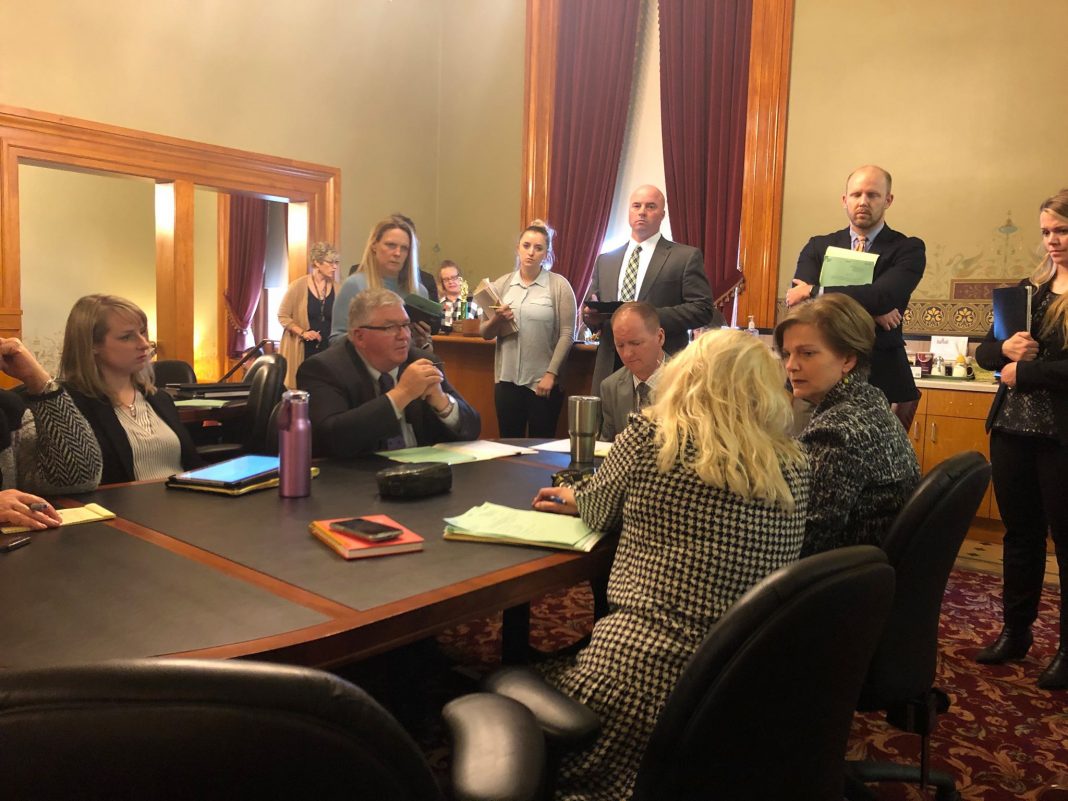Senate Study Bill 3170 went through a thorough examination during a Monday subcommittee. Few people expressly advocated for or against the legislation initially, but as discussion went on, it seemed more and more concerns were uncovered.
“My belief is we’re trying to make sure there’s a difference between livestock and livestock use — between how animals are used for purpose of livestock production as far as say, cattle dogs,” said Sen. Jeff Edler (R-State Center). “This is my interpretation of it, at this point, using a Schedule F to clearly define where that line is, as far as whether it is a livestock animal or companion animal for that purpose.”
Sen. Dan Zumbach (R-Ryan) said the bill came out of the Amish community. He added that they’re afraid some animals can get vacuumed into the pet side when they’re really on the farm side.
Sen. Liz Mathis (D-Hiawatha) referred to other bills in the legislative process that deal with animal cruelty.
“This just feels like it’s coming out of leftfield,” she said.
Zumbach said his understanding of the bill is that if you’re a farmer with animals in your care, they are livestock.
Emily Piper of the Humane Society of the Midwest and its Affiliates said she has a dog and she used to have ownership in a farm and filed a Schedule F.
“If I read this correctly, that would mean I’d be considered animal agriculture and not subject to some of the penalties for abuse or whatever of my own individual pet, simply because I have a Schedule F. Is that the way you understand this?”
Edler said it was a correct understanding.
“I think that’s very problematic,” Piper said. “That’s a very broad change.”
Colin Grace of the Animal Rescue League said the group has been consistent on making sure there is clear division in the Code on how to treat companion animals and livestock.
“To Emily’s point, it kind of seems like you’re kind of blurring those lines,” he said. ”
Zumbach said he wanted to move the bill to continue the discussion, but Mathis said she isn’t comfortable moving the bill because answers are lacking.
“No one is talking and we’re just kind of advancing a bill that was an idea that somebody brought to you from Northeast Iowa from the Amish community,” she said. “I just don’t think that’s enough to move this on.”
Preston Moore of the Humane Society of the United States said the group would oppose the bill as it is written.
“I think I’ve been pretty fair up here and mindful in that I respect what farmers do in this state,” he said. “We believe 99.9 percent of farmers are good actors, but I don’t think that we should legislate permission for any of those farmers to not provide an acceptable standard of care to their dogs whether or not they are a working dog.”
Piper said she understands the animal agriculture part and the working dog part, but has concern that anyone who files a Schedule F, regardless of whether they’re living or working on a farm and has companion animals, is now no longer subject to the provisions that govern companion animal neglect and abuse.
“They’re now put under the agricultural section,” she said. “In this state, I couldn’t come up with a number of them, but I live in Des Moines but have filed a Scheduled F, there’s a lot of people who do that. There’s a distinction we need to think about if you’re going to move this forward. Because of the use of Schedule F, you are bringing in anybody and everybody who files that regardless of whether those are working farm dogs or not.”
Mathis did not sign in support of the bill. She said she didn’t see putting time and energy into this bill when there are other bills dealing with animal cruelty.
Edler and Zumbach both supported the bill to continue the conversation.
“The only concern I have today in this discussion, and I’m picking up a sense, simply because some folks may not fall under the law that they suddenly become intentional animal abusers,” Zumbach said. “I think that’s a very unfair assumption, that if someone doesn’t fall under the companion animal bill, that suddenly they’re going to be abusers. I think that’s just an unfair assessment, period. That’s just the tone I picked up in here.”












